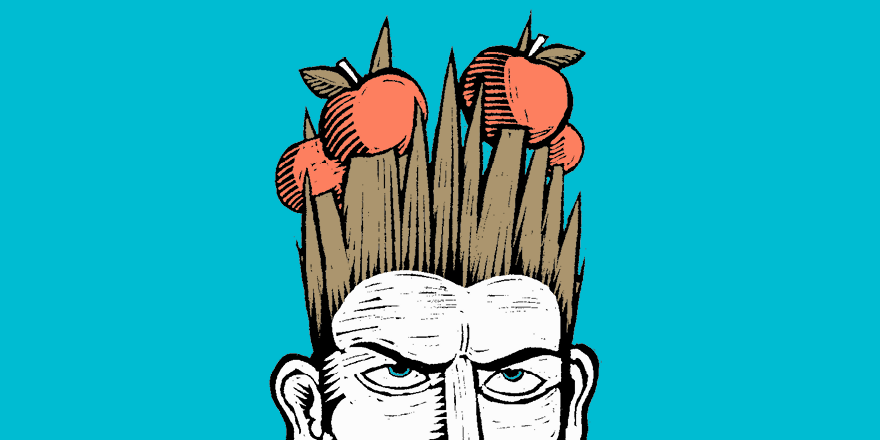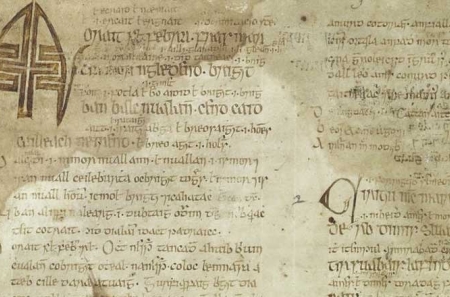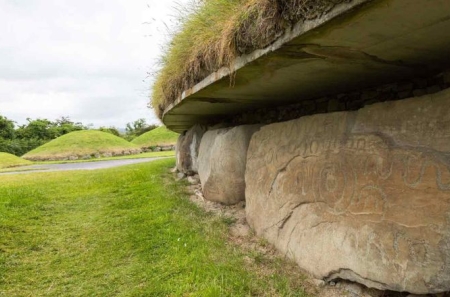
#RIA100Words: in search of our favourite Irish words
01 April 2020Downloads
A message from our author Sharon Arbuthnot
In celebration of Seachtain na Gaeilge 2020 and the wonderful banners which have been lining the streets of Dublin to mark our recent publication ‘A History of Ireland in 100 Words’, we invited users of social media to send us their favourite Irish words from the past or present using the hashtag #RIA100Words. As an incentive, all of those who nominated words were entered into a prize draw for signed books and other goodies. We thought we might get 100 words to commemorate ‘100 Words’, but by the time the competition ended on St Patrick’s Day, a phenomenal 235 words and phrases had been submitted by 297 speakers and learners of Irish around the world. So, what are the best-loved Irish words? And why do people like them?
Many of the words and phrases put forward for the draw feature also in the ‘100 Words’ book, such as grá ‘love’, cara ‘friend’ and mac tíre ‘wolf’. But as contributors explained why they had chosen particular words, it became clear that these each struck a chord for a different reason. Grá was one of large number of words loved for their sound; ‘awww’ as one person put it, mimicking the pronunciation of the end of the word. Apparently, we just like how some words ‘feel in mouth’. Other words that our hashtaggers enjoy savouring are plámás ‘flattery’, giuirléidí ‘knick-knacks’, suaimhneas ‘tranquility’ and uafásach ‘terrible’. The appeal of uafásach seems to be greatly enhanced by its potential for aligning sound and sense – in other words, it is possible to say it in a way that conveys a great amount of disdain!
Grá too has an obvious emotional resonance. One of our earliest submissions noted simply: ‘grá says it all’. Thinking about the meanings of many of the suggested words, it is difficult to avoid making connections with present times. On the minds of many are meitheal ‘people of common purpose’, muintir ‘community’ and gabh misneach ‘take heart’. More personal associations played a part in other selections: cara is not only ‘friend’ but also a daughter’s name, a Spaniard who made a temporary home in Wicklow relates to the old phrase cú glas, which referred to an outsider living in medieval Ireland. It comes as no surprise that Wikimedia Ireland chose ciclipéid ‘encyclopedia’ while Gaelchló went for cló ‘type, font’!

Unsurprising also was the fact that many words stood out in people’s memories because of their strong associations with the individuals who use or used them. The voices of former school-teachers gave us amadán and óinseach, both of which mean ‘fool’, while parents and grandparents inspired a love of tuigim ‘I understand’ and seift ‘plan’. The latter was suggested by the eventual winner of the draw who told us that her grandmother used it in North Tipperary. Memories of a different kind prompted one Twitter-user to nominate agus ‘and’ as her favourite Irish word – it was, she said, the first word that she could pick out in conversations.
A world away from the simplicity of agus, we were sent a clutch of phrases admired as clever and creative uses of language. Amongst these, bóín Dé ‘ladybird’ (which means literally ‘God’s little cow’) and smugairle róin ‘jellyfish’ (literally, ‘seal’s spittle’) emerged as clear favourites. Both of these probably entered the language in the last 150 years, but there is a longer history behind the names of other animals, insects and birds that were voted for frequently. Damhán alla, for example, is a bizarre concoction which translates as ‘wild little ox’, but the phrase has been used for more than millennium to refer to a spider.
Finally, many of the terms sent in reminded us of how beautifully Irish words can move from one sense to another and how the language has an abundance of words for things that you didn’t even know you needed a word for! Some of our favourites were:
cuasnóg ‘a wild bees’ nest’ and thus ‘a lucky find’
aiteall ‘a fine spell between showers’
airneánach ‘a person who is fond of staying up late’
ragaire ‘a late-night rambler’
beochaoineadh ‘a lament for somebody alive who has gone away’
sclimpíní ‘dancing lights before one’s eyes’
turloch ‘a lake which dies up in summer’
amainiris ‘the day after the day after tomorrow’
and, of course, Anbhuilceadagamdulamachmásédothoilé? ‘Can I go outside please?’, which one participant recalled saying in a single breath in childhood.
We enjoyed enormously seeing the vast range of words that hold a special place in the hearts of those who are speaking and learning Irish at home and in more distant parts. And we enjoyed even more the stories told and memories shared in explaining why particular words mean so much. Huge thanks to everyone who made #RIA100Words possible. Go raibh míle maith agaibh!
Sharon Arbuthnot



